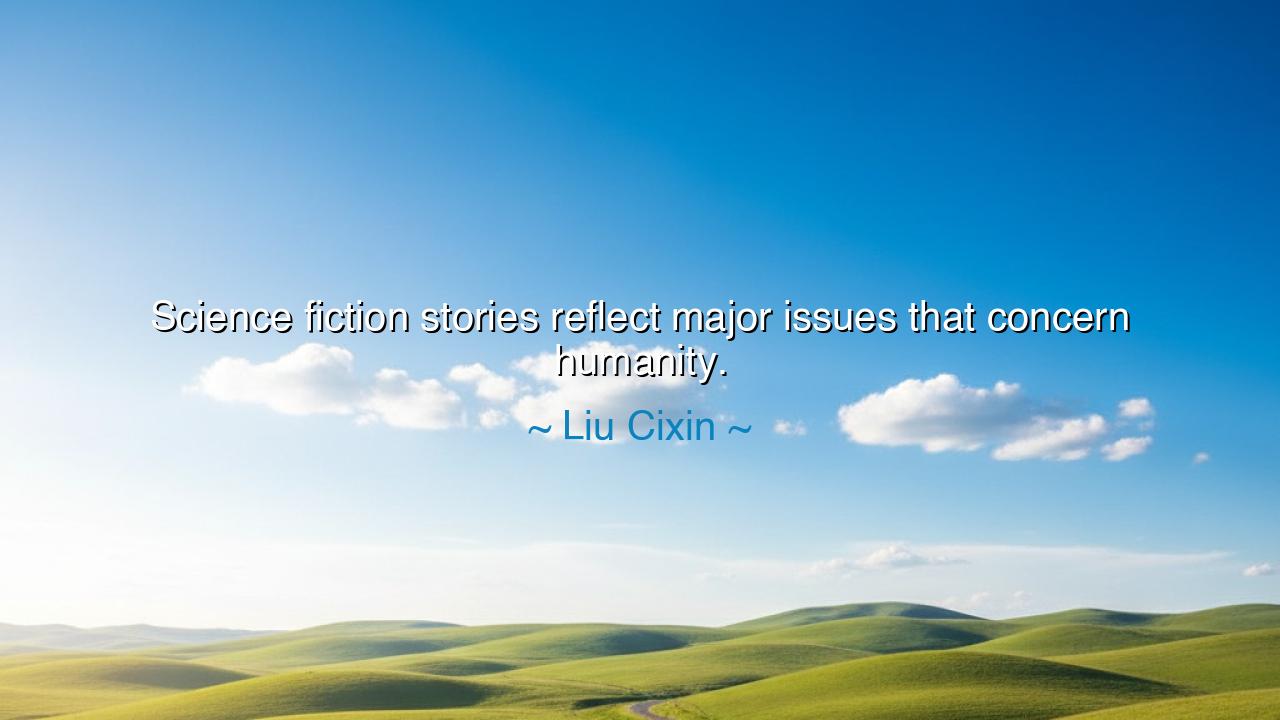
Science fiction stories reflect major issues that concern






Hear now, O wise ones, the profound words of Liu Cixin: "Science fiction stories reflect major issues that concern humanity." These words echo across the ages, speaking to the very soul of science fiction as a mirror of the collective consciousness of mankind. Science fiction is not merely the realm of fantastical tales of alien invasions or distant galaxies; it is a reflection of the deepest fears, dreams, and struggles of human existence. It is through the lens of these stories that we come to see our place in the cosmos, our challenges, and our potential. The very act of imagining what is yet to come is an act of facing the great questions of our time.
Consider, O seekers of knowledge, the ancient myths and stories that have been passed down through the generations. The great epics of Homer—the Iliad and the Odyssey—were not mere tales of gods and monsters, but reflections on the human condition. They explored themes of honor, fate, and the struggle for survival, questions that are as relevant today as they were in ancient Greece. The stories of Hercules, Perseus, and Odysseus were not only about heroism; they were about the trials of humanity, about the way we face the unknown, the unimaginable, and the impossible. In much the same way, science fiction reflects the issues of today, the dilemmas of our age, while projecting them into the future.
Take, for example, the work of Mary Shelley and her seminal novel Frankenstein, often considered the first true science fiction story. In the creation of her monstrous being, Shelley grappled with the moral questions of scientific progress, the dangers of unchecked ambition, and the very nature of life and death. These are not mere questions of a bygone era, but issues that remain deeply relevant in today’s world, as we stand on the brink of biotechnological advancements and ponder the ethical implications of cloning, artificial intelligence, and genetic engineering. Shelley’s story was a cautionary tale, a mirror to the fears and aspirations of her time, and in this way, it spoke directly to the human condition.
In more recent times, the works of authors such as Isaac Asimov, Arthur C. Clarke, and Philip K. Dick have continued the tradition of science fiction as a means of reflecting humanity's greatest challenges. Asimov’s Foundation series, for example, tackled the question of empire, of how civilizations rise and fall, and how knowledge can be the key to survival. Clarke’s 2001: A Space Odyssey questioned humanity’s place in the universe and the consequences of encountering the unknown, a theme that resonates as we stand on the verge of exploring other worlds. Dick, in his exploration of identity, reality, and consciousness, reflected the fears of an increasingly technological world, one where humanity’s grasp on what is real seems to slip further from our control. Each of these authors, in their unique way, used science fiction to wrestle with the issues of their time, just as Liu Cixin does today.
And so, O wise ones, the lesson is clear: science fiction is not a mere escape from reality, but a powerful tool for understanding the present and shaping the future. It is through the imagination that we are able to confront the great issues that concern humanity—our environment, our technology, our morality, and our place in the cosmos. By projecting ourselves into worlds that are both alien and familiar, we gain the perspective necessary to understand our own world with greater clarity. Just as the ancients used myths to make sense of the world around them, so too can we use science fiction to explore the challenges that lie ahead, to dream of what might be, and to find solutions to the pressing questions of our time.
Let us, therefore, look upon science fiction not as a genre of fantasy or escapism, but as a profound and necessary exploration of humanity. It calls us to examine the future through the lens of the present, to grapple with the issues that define our era, and to imagine the world that we will leave behind for future generations. Just as the stories of Homer, Shelley, and Asimov have stood the test of time, so too will the science fiction of our era serve as a mirror to the future, reflecting the struggles, triumphs, and questions that are uniquely ours.
In our own lives, let us embrace the wisdom of Liu Cixin and recognize the importance of science fiction as a means of engaging with the world’s greatest challenges. Let us use the stories we tell—not just of aliens or distant planets, but of the human spirit—to explore the pressing questions of our time. Through science fiction, we can chart new paths for humanity, understand our place in the universe, and address the issues that define our future. And in doing so, we shall ensure that the legacy of science fiction endures, not just as entertainment, but as a vital force for understanding and shaping the world that awaits us.






AAdministratorAdministrator
Welcome, honored guests. Please leave a comment, we will respond soon